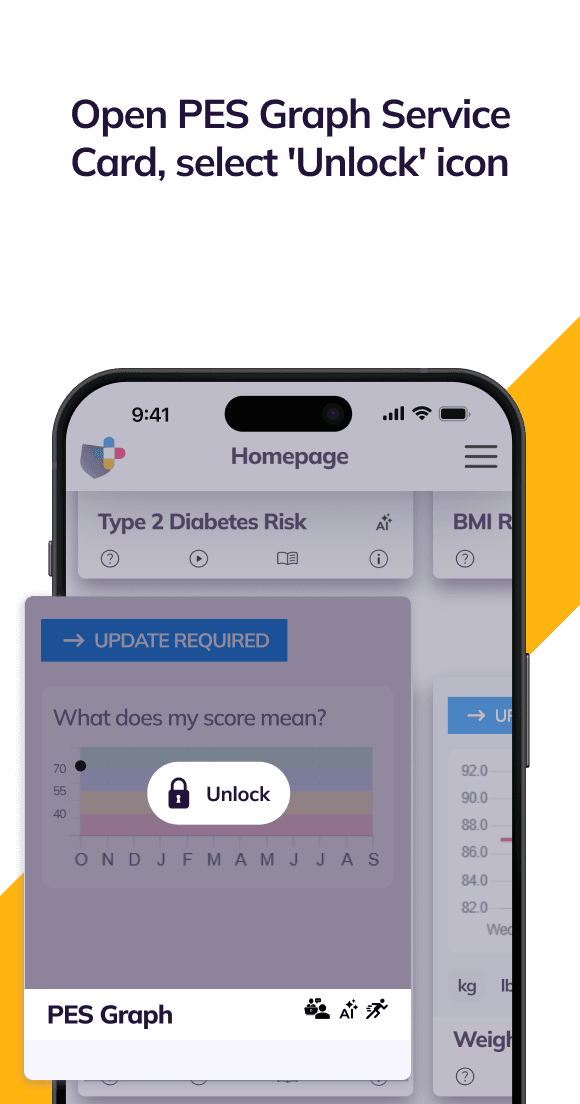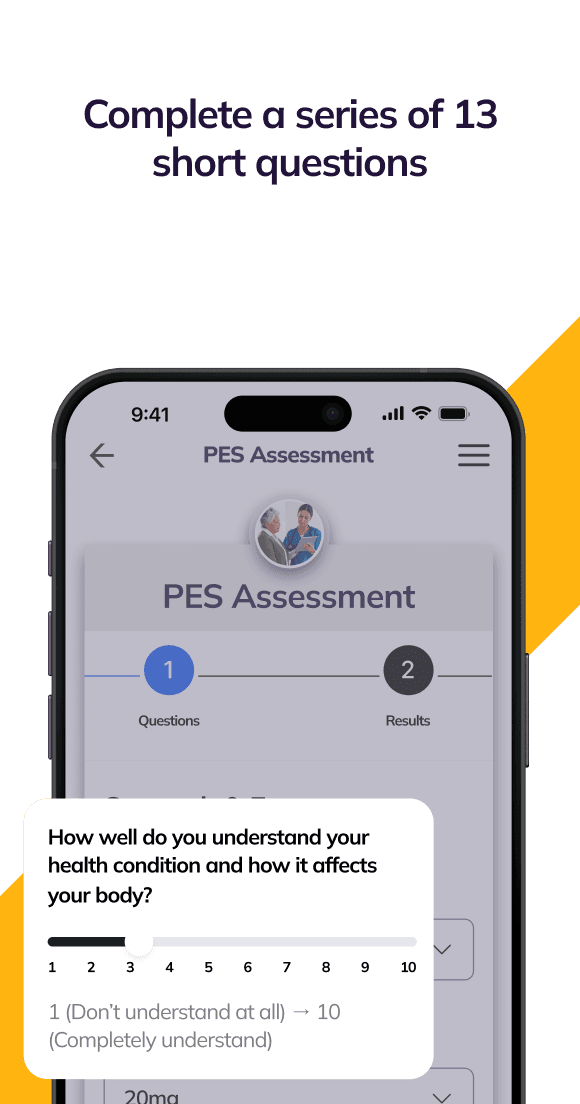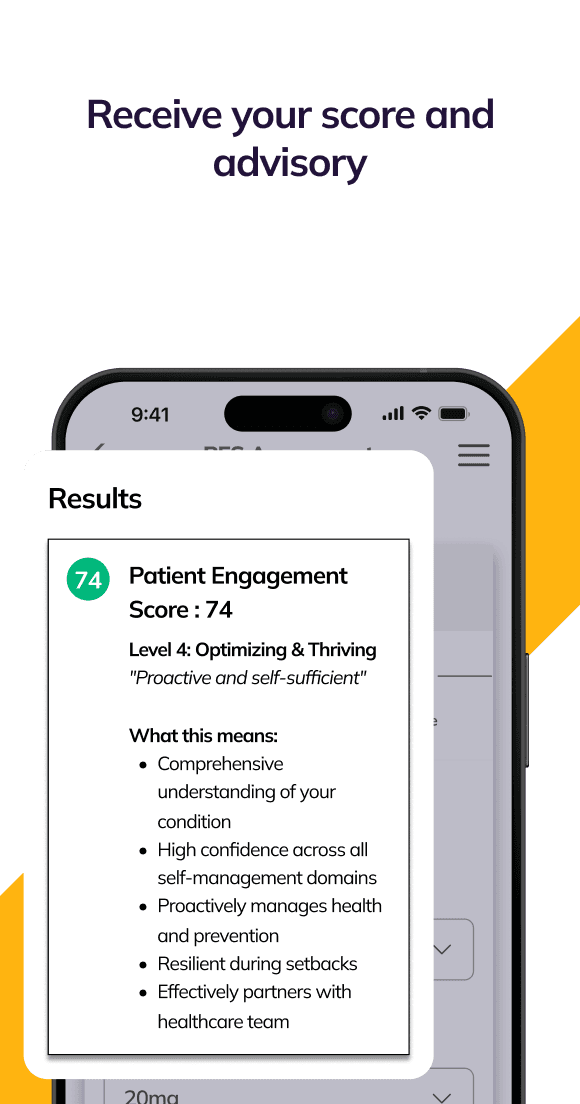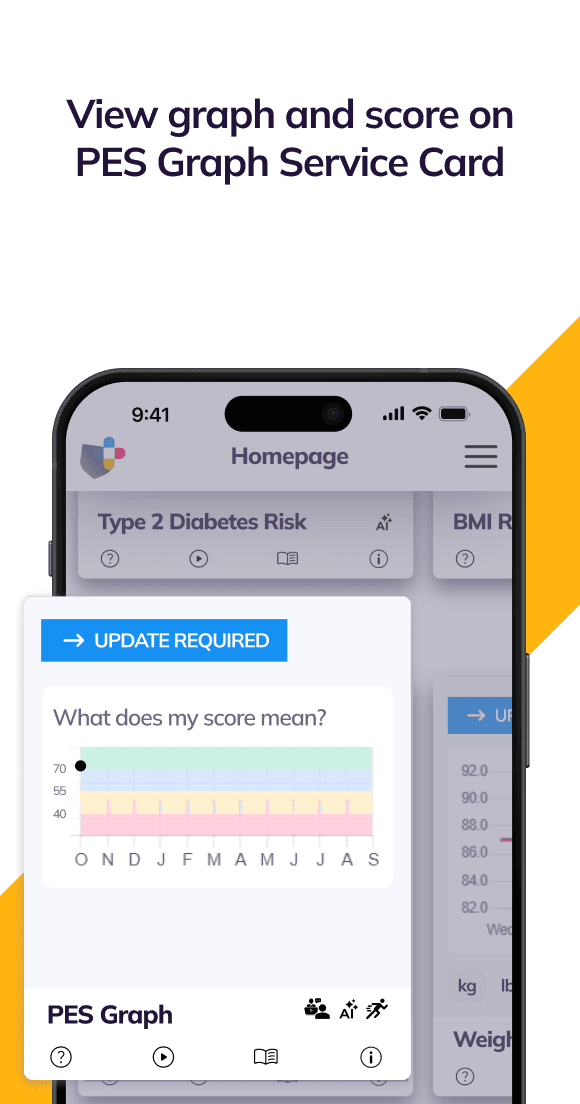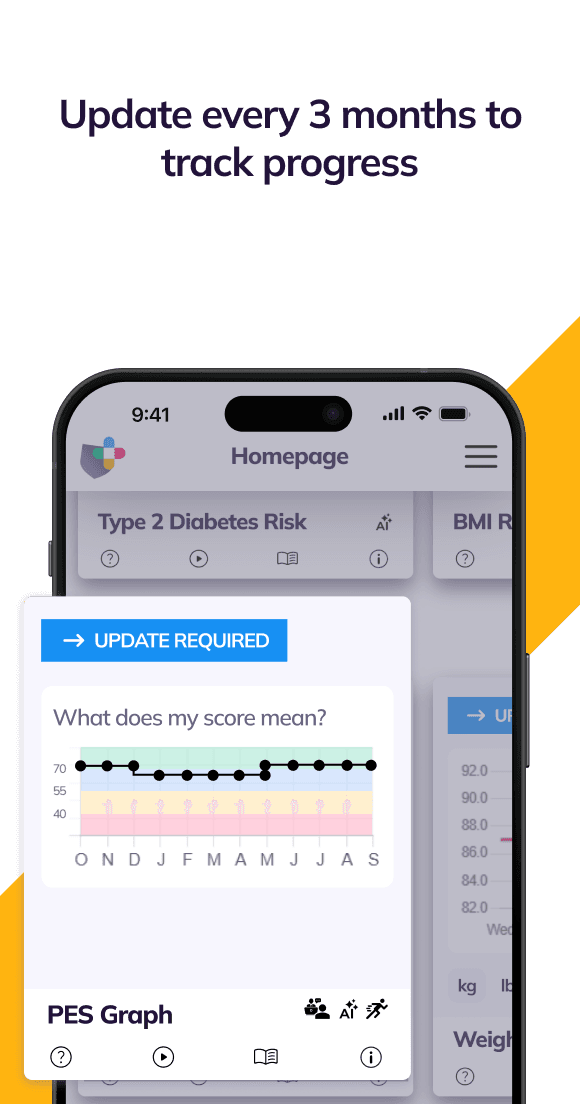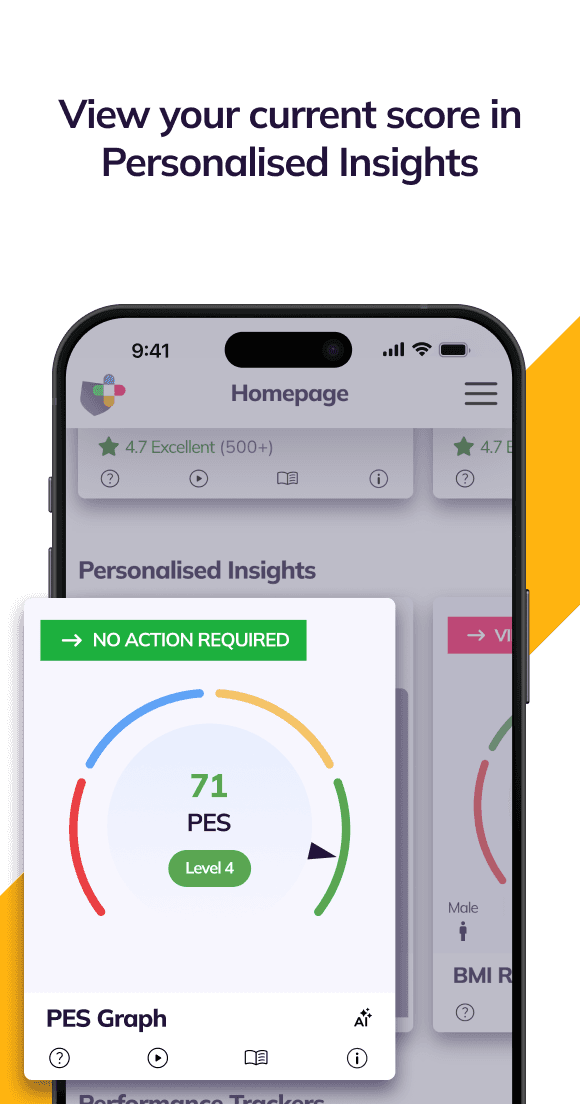How Patient Engagement Score Works
Take the Patient Engagement Score (PES) assessment to understand how confident and knowledgeable you are about managing your health. Answer 13 quick questions to receive your score from 0-100, classified into four levels.
Your score determines the type and frequency of personalized health information and clinical support we provide. Update the assessment every 3 months to track your skills, knowledge, and engagement in your own health journey.
Smooth, simple, seamless
Your Guide to Using the Patient Engagement Score App Feature
SERVICE GUIDE
Everything You Need to Know About Patient Engagement Score
What is PES (Patient Engagement Score)?
PES (Patient Engagement Score) is a proprietary, evidence-based clinical performance scoring system developed by NowPatient that measures your knowledge, skills and confidence in managing your own health and healthcare.
NowPatient uses this score to determine how often and to what extent we provide tailored health information and education. We base this on your knowledge and your confidence in managing your own health, and your existing use of self-management behaviours.
Research Foundation
The PES is built on a solid foundation of peer-reviewed research and validated assessment frameworks:
- Stanford Self-Efficacy Scales: The 6-Item Self-Efficacy for Managing Chronic Disease Scale (Lorig et al., 2001) demonstrated reliability (Cronbach’s α = 0.91) in measuring confidence across symptom control and disease management.
- CanSMART Framework: Lambert et al. (2022) validated a multidimensional approach to assessing self-management with 306 participants, identifying critical domains across medical management and lifestyle modifications.
- Connection to Health Model: Hessler et al. (2019) documented that patients with chronic disease experience an average of 7 concurrent self-management challenges across 12 problem areas.
- Self-Management Tasks Framework: Schulman-Green et al. (2012) identified three core categories of self-management that inform our assessment approach.
- Chronic Care Model: Wagner’s model emphasizes patient self-management support as essential for effective chronic disease care (Wagner et al., 2001).
The Four Assessment Domains
PES assesses four interconnected domains through 13 carefully designed questions:
- Knowledge & Understanding (3 items): Your comprehension of your condition, treatment rationale, and when to seek help
- Skills & Behaviors (4 items): Your ability to perform self-care tasks including symptom monitoring, medication management, and healthcare navigation
- Confidence & Self-Efficacy (3 items): Your belief in your ability to manage health, make lifestyle changes, and communicate with healthcare providers
- Action & Engagement (3 items): Your current level of active participation in treatment, prevention behaviors, and healthcare decisions
How do I obtain my PES Score?
Navigate to the ‘Performance Trackers’ Section and select the ‘PES Graph’ Service Card on the account homepage.
If you have not used the PES score before, the card will be locked. Click the ‘Unlock’ icon to be taken to a page where you will need to complete a series of 13 short questions.
What happens after I complete the PES assessment?
After you have completed the series of short questions, you will be given an engagement score, which is ranked between 0 and 100. Your responses are converted to a standardized score using a proprietary formula.
What do the PES scores mean?
Depending on your engagement score, you will be classified as Level 1, Level 2, Level 3 or Level 4. The highest score is Level 4, and the lowest score is Level 1. The higher the score, the less support you need. The lower the score, the more likely you are to benefit from more targeted support around your health condition.
Based on your score, we will adjust the frequency and methods we use to proactively engage with you. We use this score to work out how active we need to be in terms of providing you with health education and resources. This allows us to efficiently target our clinical resources to benefit you.
After I complete a reassessment, how can I track if I am improving?
PES is a dynamic measure and we require users to resubmit the assessment once every 3 months.
Based on your baseline level (The level designated when you took your first assessment), you will be invited to complete a reassessment. The frequency of reassessment is based on your baseline level:
Level 1 patients: Every 3 months
Level 2 patients: Every 4 months
Level 3 patients: Every 6 months
Level 4 patients: Annually
You will see an ‘Update Required’ prompt on the ‘PES Graph’ and also a notification, which is viewable in the ‘Notifications’ Section of the account homepage. You can click the ‘Update Required’ button on the ‘PES Graph’, after which you will be taken to the reassessment page. After the reassessment, you will receive a new score. This will then update your graph so you can visually track how you are progressing.
PES Level Scores Explained
Level 1: Building Foundation (Score 0-40):
“Not ready for self-management”
What this means:
- Limited understanding of your condition
- Low confidence in managing symptoms
- Minimal active engagement in care
- May feel overwhelmed or passive about health management
- Requires significant foundational support
Support you’ll receive: Monthly personalized education and resources will be sent by email with intensive education focused on building foundational knowledge. Research shows approximately 15-25% of chronic disease patients begin at this level.
Level 2: Developing Capability (Score 41-55):
“Becoming aware but struggling”
What this means:
- Growing awareness of self-management importance
- Developing knowledge but lacking confidence
- Beginning to develop skills but application is inconsistent
- Motivated but needs guidance and encouragement
- Recognizes the need for self-management
Support you’ll receive: Every 2 months personalized education and resources will be sent by email focused on skills training, confidence building, and structured problem-solving training. Research shows approximately 25-35% of chronic disease patients are at this level.
Level 3: Actively Managing (Score 56-70):
“Taking action with growing confidence”
What this means:
- Good understanding of your condition and treatment
- Confident in most self-care tasks
- Actively following treatment plans
- Maintains consistent health behaviors
- Occasional challenges with complex situations
Support you’ll receive: Every 3 months personalized education and resources will be sent by email focused on reinforcing successful behaviors, advanced problem-solving, and lifestyle optimization. Research shows approximately 30-40% of chronic disease patients reach this level.
Level 4: Optimizing & Thriving (Score 71-100):
“Proactive and self-sufficient”
What this means:
- Comprehensive understanding of your condition
- High confidence across all self-management domains
- Proactively manages health and prevention
- Resilient during setbacks
- Effectively partners with the healthcare team
Support you’ll receive: Every year personalized education and resources will be sent by email with minimal support model, maintenance focus, and optimization opportunities. Research shows approximately 15-25% of chronic disease patients achieve this level.
What happens after I receive my PES score?
After you have received your score, you will have the option to return to the account homepage, where you will be able to see your ‘PES Graph’. This allows you to track how you are progressing with your health self-management. The graph is updated after every 3 months following a reassessment.
How does my PES score update on the PES Graph?
Because PES is a dynamic measure, we require users to resubmit the questionnaire once every 3 months. Every three months, you will see an ‘Update Required’ prompt on the ‘PES Graph’ and also a notification, which is viewable in the ‘Notifications’ Section of the account homepage. You can click on the button on the ‘PES Graph’, after which you will be taken to the reassessment page. After the reassessment, you will receive a new score. This will then update your graph so you can visually track how you are progressing.
It also allows us to make sure that you are receiving the right frequency of health information, education, and most importantly, support.
How do I know if PES is actually useful?
PES has been extensively researched and developed from validated assessment frameworks that have been shown to be reliable measures of patient engagement and self-management capability. Studies have shown that higher engagement level scores are associated with healthier behaviours, better health outcomes, and lower healthcare costs. The evidence base includes research from Stanford University, validated chronic disease self-management studies, and peer-reviewed publications documenting the relationship between patient self-efficacy and clinical outcomes.
Give me an example of how you tailor engagement with me?
NowPatient continuously assesses your health profile and your PES score. We use this information to predict which resources we believe may be beneficial to you and at what frequency. For example, if you have Heart Disease and a lower PES score (Level 1), we will send you educational resources by email every month. We may also recommend community forum rooms that focus on Heart Disease so you can get peer support. If you’re at Level 3 or 4, we’ll provide less frequent touchpoints (every 3 months or yearly) focused on maintaining your success and advanced problem-solving.
Will you prompt me to complete the assessment, if I have not completed an assessment?
We recommend all users of NowPatient complete the assessment. This allows to record a baseline and then tailor our services to you. In addition, we continuously assesses your health profile and your PES score to determine what products or services we think may be suitable for you. If you have recently filed an unplanned hospital admission record in the ‘Report Hospital Admissions’ Service Card, and you have not completed an assessment, then we will prompt you to do so. This will trigger interventions that may help you avoid further unplanned hospital admissions.
Can I trust the information you supply me with?
We have partnered with Drug Companies, Health Charities, and the NHS to bring you various health information resources. This includes information about Healthy Living, Medicines A-Z, and Conditions A-Z. This authoritative content comes from a known source and can be trusted, unlike some other information found on the internet.
We also have a comprehensive list of health-related articles covering many conditions that are written by our in-house team of clinicians. Our editorial process sets out the standards of the content we produce for you.
Is Patient Engagement Score safe for me to use?
Yes. Patient Engagement Score is classified as a class I medical device under UK MDR 2002 regulations, for its intended use.
Key References
- Lorig, K. R., et al. (2001). Chronic Disease Self-Management Program: 2-year health status and health care utilization outcomes. Medical Care, 39(11), 1217-1223.
- Lambert, S. D., et al. (2022). The CanSMART Study: Development and validation of the Cancer Self-Management and Activation Research Tools. Psycho-Oncology, 31(3), 306-318.
- Hessler, D. M., et al. (2019). A systematic review of self-management support interventions for diabetes. The Diabetes Educator, 45(6), 605-625.
- Schulman-Green, D., et al. (2012). Processes of self-management in chronic illness. Journal of Nursing Scholarship, 44(2), 136-144.
- Wagner, E. H., et al. (2001). Improving chronic illness care: translating evidence into action. Health Affairs, 20(6), 64-78.
- Bandura, A. (1977). Self-efficacy: toward a unifying theory of behavioral change. Psychological Review, 84(2), 191-215.





